Personal Modification Is Not Revolution
Lea Melandri
Preface
Italian autonomist feminism emerged in the late 1960s and 1970s, in large part as a response to the failures of 1968 and the New Left. In critical dialogue with Operaismo, thinkers of the movement worked to problematize a Marxist orthodoxy that had neglected the role played by gendered labor in the reproduction of capitalism. By classifying domestic work as reproductive labor — itself the site of the constitution of gender, made invisible by way of the wage relation — and launching initiatives such as Wages for Housework, the Italian feminists such as Silvia Federici and Mariarosa Dalla Costa along with their international cohorts became best known for redefining materialism through a feminist lens, transforming the dynamic of workerism as a practice, and emphasizing political autonomy over aims of equality. Italian feminists interrogated difference rather than championing common ground between the sexes, setting them apart from many feminist initiatives elsewhere.
Lea Melandri was born Maddalena Melandri in Fusignano in 1941. She attended university in Bologna before moving to Milan in 1967, after which she soon became involved in the burgeoning current of feminism there. Through her engagement with a broader tendency of Marxist thought, Melandri was also among those who theorized gender through psychoanalysis, a task embraced concurrently by French philosophers such as Luce Irigaray and Hélène Cixous.
The text presented here — the first of two to be released through Ill Will this winter — appeared originally in a 1977 edition of the magazine L’erba voglio, which Melandri edited along with psychoanalyst Elvio Fachinelli from 1971 to 1978. In it, she presents an internal critique of “the practice of the unconscious,” an experimental project of collective psychoanalysis undertaken by many Italian feminists. This practice was part of a broader analytical framework, employed as a means by which to understand the ideology of patriarchy as it manifests in the interpretation of difference among women. Through the progression of the text, Melandri identifies, among other things, a shortsighted emphasis on personal transformation as a revolutionary accomplishment. Revisiting the text today, it is less its binary presentation of gender that is of interest than the ongoing tensions it raises: the importance of gender as a problem of material difference, rather than biological or cultural; and the urgency of interrogating such a difference, and building autonomy from within it, without becoming unintentionally mired in the realm of the individual.
Both Lea Melandri’s identification of a “paralysis of political practice” and the philosophical project of Italian feminism writ large, although rooted in their specific context, reverberate with the contemporary task of navigating escalating crises amid a collapse of traditional political distinctions. These works can inform efforts to grapple with difference as an irreducible catalyst — not a thing to be resolved or sidestepped, but a thing to be reckoned with, forged into a site of revolutionary potential.
—Leijia Hanrahan, January 2021
Other languages: Español
In recent years, the opportunities for meetings, knowledge, and common practices between women have intensified.
We have accumulated experiences of personal changes and collective work which are original and complex. What is it that prevents us from seeing in them a political achievement of our collective, and of so many other women?
To say that power relations have been recreated, or that they never disappeared, is to say everything and nothing. We should ask ourselves why we have still never been able to analyze what power between women means, nor how it specifically originates.
Psychological explanations are reductive and generic. To underscore every instance where, despite our best efforts, we continue to act like ‘fathers’, ‘mothers’, ‘men’, ‘women’, ‘children’, ‘parents’, inevitably generates the conviction that reality is, at base, merely a web of projections-introjections, fantasies, personal dreams. It leads us, in other words, to idealism, or worse, psychologizing drivel.
Since the paralysis in question is essentially a paralysis of political practice (and not of personal relationships, which, on the contrary, are very alive), I think that we must seek the reasons for it in this very practice.
What follows are a few observations on the subject.
Specificity
Our practice should have highlighted the materiality of those relationships that have their historical origin in the difference between the sexes. It should have made us aware of contradictions hitherto ignored, such as those between man-woman, individual-collective, sexuality-politics, etc. It should have highlighted, for that very reason, ideological abstraction and the market of relations within those political practices that claim the mantle of Marxism today.
Instead, what is apparent in our meetings and the experience of living together is often a mere reversal of the terms of the contradiction: individual history against collective projects, everydayness against political involvement, psychological analysis versus economic analysis, and so on.
Hence the immobility, the sense of unreality, the theoretical confusion and the boredom that arises from the repetition of such discourses, with their uniformity of language.
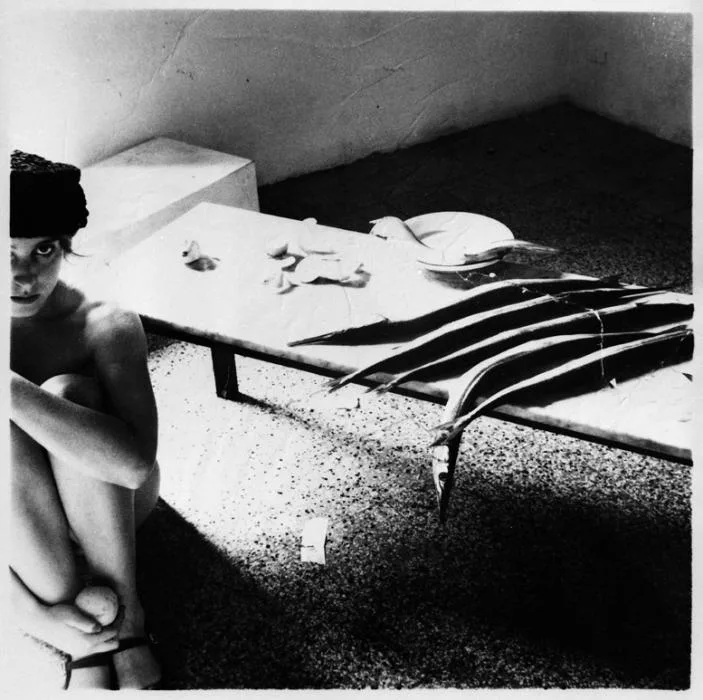
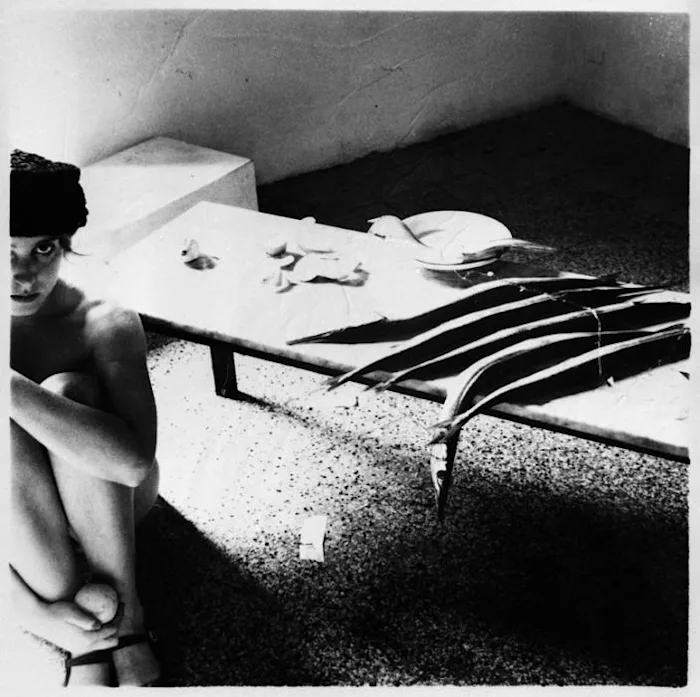
As we know from experience, the energies of women are consumed in a separate affective life. A practice of liberation should, at the very least, diminish the fixity of the affective and emotional situations that have constituted our misery: the need for love, dependence, hysterical conversions, insecurity, etc. This will certainly not happen if we go on reinforcing our separation, if we take over the idealistic distortions of psychology, and continue to deny or imagine the social and economic reality that we carry within us — in the way we act, and in our relationships with each other — as an external and hostile reality.
(It should be enough to give the example of the commercialization of feminism: political merchandise, journalistic merchandise, merchandise for the uptake of new fashions, new sexual behaviours…etc. We often denounce the external aspect, the aggression and the recuperation of our work, without realizing that it is being enacted within the very practice of the movement, or by women who claim to belong to it.)
The Analysis of Difference
The ‘practice of the unconscious’ is intended to offer a safeguard against ideological temptations. In fact, it has freed us from unitary illusions, from solidarist sentimentalism and organizational dreams. However, it has not allowed us to advance very far in our analysis of the differences that exist between us. We speak about differences often, but always in a more or less abstract way: as opposed desires or experiences (I feel good, I don’t); as power relations (who speaks and who does not, who makes decisions and who does not); as parental psychological dynamic (me the mother, me the daughter). We almost never remember that personal differences refer to an objective context, namely, the economic, cultural, familial, or emotional milieu in which each of our histories developed, and in which we live. We almost never remember that, through individual difference, through the history of each one, pass all the specific contradictions of our historical condition as women.
The difficulty, but also the originality of our work lies in the fact that it does not allow itself to be tempted by ideology (difference = contradicting the norm), by psychology (difference = the result of personal history), by false objectivity (difference = divergence of political lines) nor, naturally, by indifferent ‘chance’ (difference = the diversity of experiences).
To succeed in not separating, denying or opposing the multiple aspects involved in the being-different of each of us, means that we concretely modify the idea of subjectivity and objectivity that we have inherited from politics, philosophy, religion, etc.
Specularity and Real Relationships
Psychoanalysis cautions against this possibility that we would have to see each other as we really would be. The projections, masks, censures, and fantasies we sustain about each other are no less real than what we see and feel.
In the past, we considered the acquisition of an analytical attention as essential for unraveling this knot of reality and imagination and establishing less suffocating or more real relationships, and it continues to seem essential to me today.
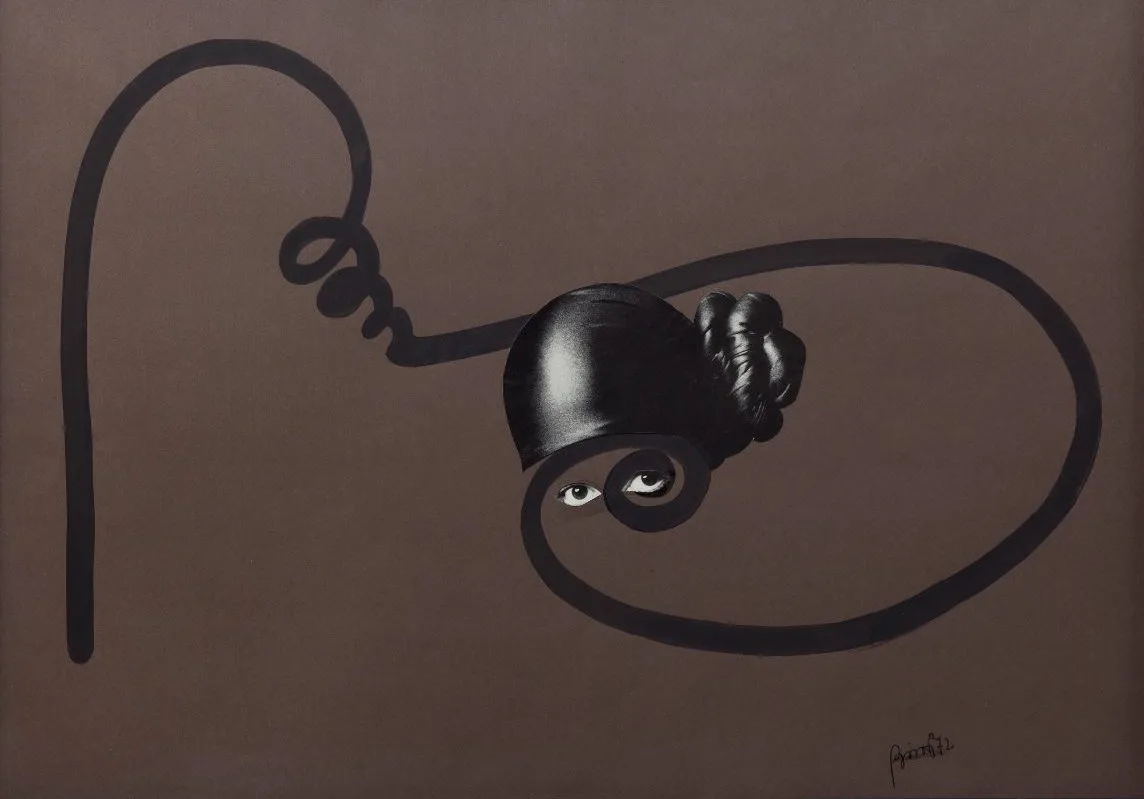
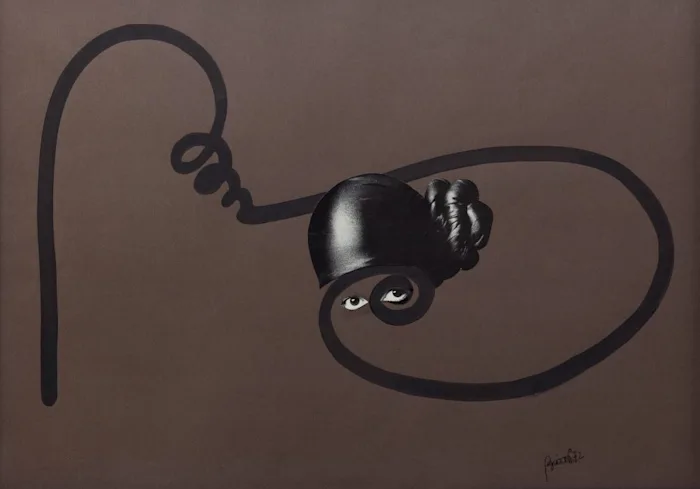
In practice, however, things seem quite the opposite. We talk to each other, but we have the impression of not understanding each other, of not seeing each other; each seems attentive only to the image of herself that the other reflects. Specularity hinders real attention to and interest in the other, or ends up highlighting, and transferring into a complex relationship, only affective dynamics. I realize that the peculiarity of analytical practice is reinforced in this case, by confronting the specific condition of women (fixation on one’s own history, preponderance of affective ties, etc.).
Can we question the ‘practice of the unconscious’ while avoiding, on the one hand, the false objectivity of content and, on the other, the negation of subjectivity, sexuality, and the imaginary?
Practice of the Unconscious and Analytical Practice
Two years ago, when the first attempts to ‘practice the unconscious’ began, we identified the following main obstacles: request for analysis, and the attribution of the interpretive function, even ambivalently, to a few definite people. Although the work that followed in several groups was felt by many women to have been positive, it nevertheless provoked some doubts and questions (I refer in particular to the work of one of these groups):
The assimilation — partly real, partly only formal — of the practice of the unconscious to analytical practice
In the absence of a fixed theme or a common activity for the women present, the weekly meeting inevitably ended up taking on the appearance of an analytical session: all contributions to the group were received in the form of personal experiences, associations, dreams, interpretations of particular cases or group dynamics. As a consequence: long silences, vouchsafing of affective assurances by the group before being willing to self-expose; deference to the interpretation of those deemed ‘capable of analysis’; disappointment in answers deemed insufficient or overly tentative; difficulty avoiding the censorship of aggressiveness and sexuality when reference was made to the women of the group.
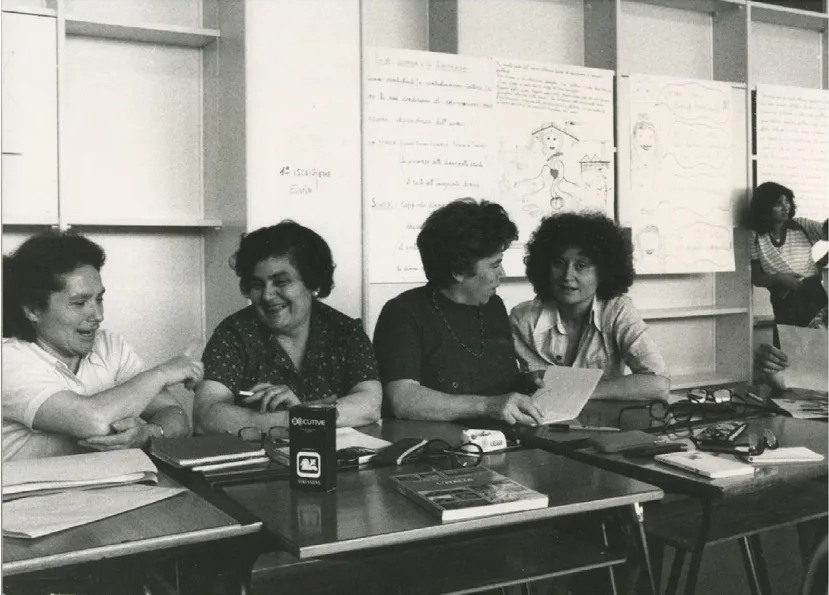
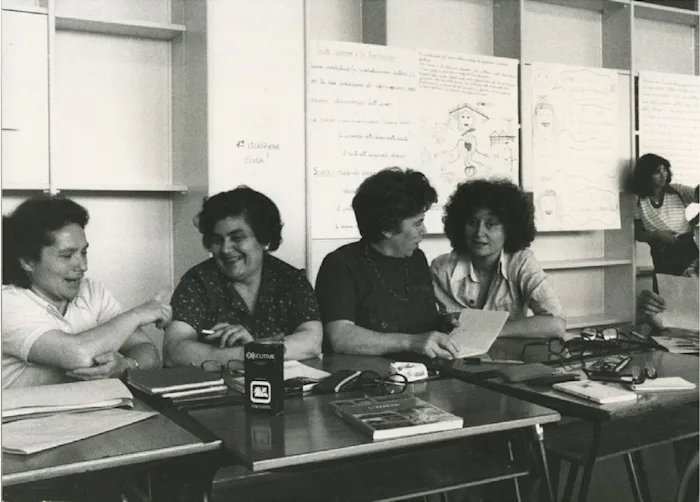
At the best of times, the group was gratified by those who said they felt ‘personally transformed’ by working together.
But individual change cannot be regarded straightforwardly as political transformation. Personal modification is not revolution.
Moreover, when a group of this kind becomes the primary site of liberatory expectations (whether it is a collective of women, or an encounter engendered by the movement), the outside inevitably becomes the site in which transferential phantasies, aggressions, and romantic relationships born within the group are acted out. As in both individual and group analytical relationships, real life ends up becoming a mime, the representation of a web [trame] that has its origin in the analytic relation itself. Analysis takes the place of the real: in the group, we talked for months about the internal relationships of the collective, while the same people who had expressed themselves in the group were silent in the collective, or delegated others to speak for them. We might think that a group, even a large one, is always more protective than a collective meeting, where differences are more marked and the chance of presence greater; we might suppose that the need, even if ambivalent, to trust a few people (who one feels are free from needs and contradictions) as interpreters of the desires and offerings of others, arises from this insecurity. The ‘practice of the unconscious’ may encourage analytical expectations. But we could also view the problem from another angle, by asking for example what ‘less protective’ even means. The flipside of insecurity is not only psychologico-phantasmatic (fear of abandonment, persecution anxiety); confrontations with those who are different from us, clashes with women who subscribe to a different political practice than us, or who simply speak a language different from our own, can also cause insecurity. If the practice of the unconscious had not, from the start, been marked by traditional ‘analytical’ modes, it should have helped us to distinguish differences and to dialectically articulate various political experiences.
Some of us may have hoped that the collective would turn into a large analytical group. But setting aside the various contradictions, intrinsic difficulties, and the opposition encountered from others, how might we have avoided the psychological, personalist distortions that came to light in the groups?
The fall of political tension
The analytic experience displaces forms of attention and energy that were originally disposed (or constrained) to remain elsewhere, shifting them onto personal history. In some women, the practice of the unconscious seems to produce a similar displacement-exposure effect. I am thinking of the frequent use in meetings of the expression ‘to lay bare’, that is, to strip oneself of the interests we usually have, to strip oneself of general words and expressions that seem out of place in meetings. This paralysis-effect, aphasia, stammering, which would arouse no special interest in an analytical session, is always unpleasantly surprising when it arises, on the contrary, in a small gathering or a political meeting. All the more so during a meal or during a vacation.
The acquisition of an analytical perspective is undoubtedly fundamental for a political practice which does not want to mutilate itself or to separate itself again from the deep reasons for individual and collective action, but it would be a rather paradoxical outcome if, to keep one eye on the investigation of [psychic] depths, we had to close both at the same time. Is it too much to ask for an enhancement of vision both vertically and horizontally?
Awareness and modification cannot follow a single direction without running the risk of abstracting the content and deteriorating relationships. The verification continues, the confrontation-showdown with all the data of reality (which, before any other politico-cultural context, concern other women) could, on the contrary, enable us to avoid entanglement, immobilization, the confusion of individual reflection with the general opinion of women, or of personal modification with collective transformation, etc.
-September 1976
Translated by Howard Slater and Ill Will.